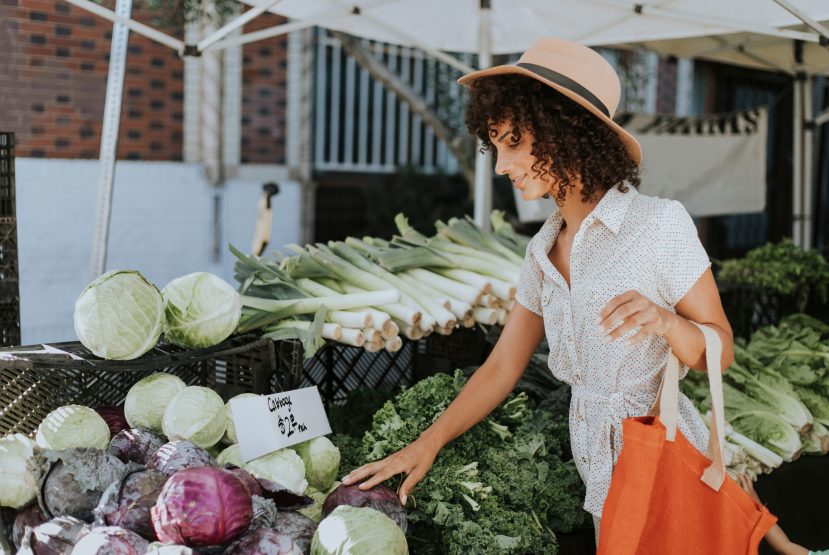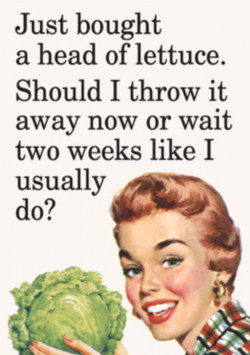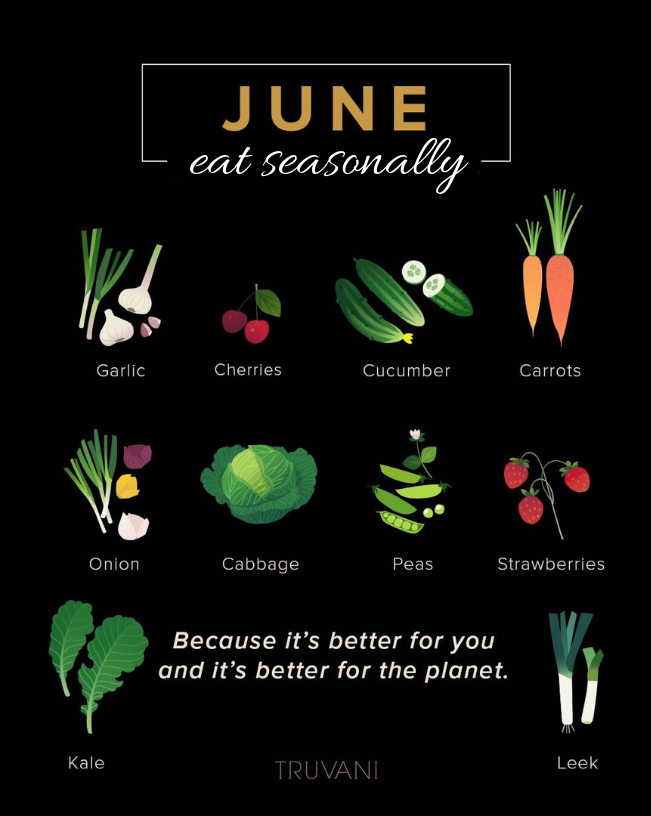Here’s How Eating Seasonally Will Help You Waste Less Food

Raise your hand if you’ve ever experienced the shame of throwing out an entire head of lettuce (or eggplant, or spinach…) that you swore you would use when you bought it?
No judgments here, guys…
Most of us have experienced the sensory overload that is the produce section of our local grocery store or farmer’s market.
Everything is so colorful and good-for-you and perfect for that recipe you pinned the other day…
So, we excitedly fill our carts and baskets and chic reusable bags with piles of vibrant fruits and vegetables.
We fantasize about unpacking and organizing our healthy haul, confident that this is the week we finally turn our #fridgegoals into reality.
This is the week we finally get around to using all that fresh food before it inevitably goes bad and starts taunting us from our countertops and refrigerator compartments.
I think we all know how this story ends…

Cue: nervous, I-really-don’t-want-to-relate-but-I-totally-do-relate laughter.
Sigh…
So, where did we go so (so) wrong?
Simple…we complicated things.
We overestimated our time.
And we ignored the one easy strategy that can help us be less wasteful and more intentional about fresh food…
Eating seasonally.
Selecting in-season fruits and vegetables is a simple, effective way to avoid wasteful habits like over-buying food you’ll eventually throw out, and over-spending on imported produce.
Eating seasonally also helps ensure that you and your family are enjoying the tastiest, most nutrient-dense foods available, since in-season options tend to be grown locally and harvested at their peak freshness.
Simplicity is the name of the game, folks…
Focusing on produce that’s in-season just makes sense because it takes the guesswork (not to mention, the supermarket-sweeps level of stress…) out of the equation. It’s a simple habit to get into…just a little online research before heading out for groceries will do the trick!
And for all you overachievers who really want to save time and streamline things, you can even sign up for a local produce delivery service, which automates seasonal eating while supporting local farmers.
So…are you ready to show that produce aisle who’s boss?
Here are some of our favorite soon-to-be-in-season fruits and vegetables to get you started:

Whether it’s seasonal eating, setting reminders to drink more water, or pre-paying for workout classes, we’re always looking for creative ways to make healthy choices that save us time and set us up for success.
Let us know in the comments what tools and habits you use to help simplify your wellness routine.
…and remember to look out for tomorrow’s email!


Comments
19 CommentsLeave a comment
Very good info
This is what I need. Is thete a way to print or buy a seasonal calendar from you to help with all the months of buying seasonal fruit and veggies? We can hang it on the kitchen wall and be less stressed . Thank you!!!
I would love this too!
I am soooo working on this! I just cleaned my fresh produce out — all except for a few tomatoes and a cucumber and some romaine. I made a huge steamed “stir”-fry and my own Satay Sauce (with no sugar), and will enjoy that a lot this week! I’m so trying not to throw out healthy food when eating it is so empowering! Thank you for your ongoing work, Vani. You are so appreciated.
Love the picture of what we should eat this month. A visual reminder is great. Please give us one every month!
Great Idea!!!!
The problem for me is I have to travel over an hour to buy organic produce that is decent. I live ‘out in the sticks’ for affordable housing and feel that I am the only person in the area who cares about eating organic. The local grocery stores have very little and it’s usually in bad condition as there is little interest in it here.
So that being said, when I make my big trip I usually load up on vegetables and other other organic products. The local farmer markets sell pies and cookies mostly. No wonder everyone is sick! I also grow my own leafy greens in the summer, but my neighbors are all out spraying Round Up near my gardens. I feel extra guilty if I don’t eat all the produce I buy since such effort was made to get it! 😂
Kathy, I have the same problem you have here in a small town in NE Florida! Can’t even find a Food Coop within 50 miles of me.
This is a cute and helpful graphic ☝️ Can you provide these for all the months??
I would be interested in a seasonal calendar for fruits and vegetables too. Thanks for all you do!!
Eat non GMO.
Thanks for this. I would LOVE if you could send out what is in season every month if possible?
There are calendars that show seasonal produce available throughout the year geographically but some of the items listed in the chart some of us like year round. I just found a way to freeze and store items like strawberries during the peak season, mainly because I have found frozen fruits aren’t frozen like vegetables. Frozen vegetables are great for those offseasons of the year when you can’t get fresh. Again the problem lies with a lack of variety during the offseason, especially in the soft fruits like melons or pit fruits or grapes and cherries. Greens are also hard to find a variety of, even using the frozen.
You do need a good space to grow produce that provides proper lighting even in container pots. I do raise herbs successfully in pots but for things like tomatoes, corn, potatoes, etc., my little area doesn’t get the right conditions to sustain a crop. More supermarkets are offering choices in produce with a larger selection of organics but if you live in an urban area like me, staffing and messy clientele create problems in the selection of good quality unblemished produce. You have to know when to go to the store, plus more local farmers markets do open up during the warm months. But you do need to know how to use up what you buy or know how to freeze it properly.
Thank you so much for all the info! It is very helpful and I am really working on eating more healthy!
I love eating veges anytime of the year and since I am 67 years young and have years of experience, I know what foods are in season. As of late I have had to adjust my vegetable buying because I was used to juicing and would go through a lot of vegetable in a week. My juicer died and we could not afford to replace it so now our grocery bill has been cut in half and I often end up putting leftover produce in the compost. I dread buying vegetables now because I just do not know how much I will end up using in a week. I hope what Truvani shares tomorrow will help me with this issue. By the way I just tried Truvani Protein Shake and it is really good!
This is great when you have access to local, in-season produce. There are a few fruits and veggies grown here on Guam for purchase, but everything else is imported from the US, and goes bad very quickly. Very little is organic, so I miss that. I mostly have to stick with conventional frozen produce, and buy organic when I can find it.
I know leek is very healthy but what can you do with it other than making soup from it?
Yes please post one for each month! I would love to print these out for the rest of the family to see (otherwise they won’t remember lol)
I, too, would love to buy all the months as a calendar or set of small posters.